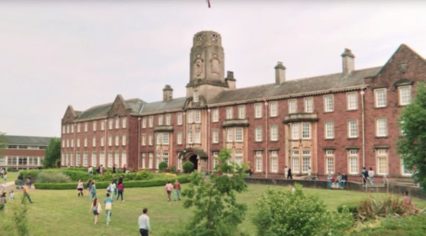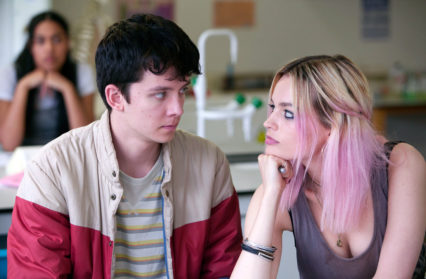Gareth Leaman investigates how Netflix’s new teen drama, Sex Education, filmed primarily in Caerleon, can be used as a metaphor for ‘official Welsh culture’.
Throughout his writing, the late Mark Fisher refers to the concept of ‘hauntology’ to describe the way in which traces of the past maintain a ghostly presence in the artworks of today. We often observe this phenomenon in texts that evoke a feeling that the horizons of political possibility have contracted: that ‘not only has the future not arrived, it no longer seems possible.’ Deployed in a British context, this usually refers to a future cancelled by the rolling back of the state and its replacement with neo-liberal marketisation, and the cultural ossification and impoverishment that has resulted.
Watching Netflix’s new ‘British’ teen comedy-drama Sex Education, viewers in Wales – and especially Newport – may well be struck with this same sense of melancholic uncanniness, of ‘a time that is out of joint’. For despite the shows liberatory and groundbreaking depiction of teenage sexuality, Sex Education is haunted by a Welsh culture and politics that has either died or never was, and whose presence is felt by its absence.
 Anybody familiar with the locality will instantly recognise that the show is filmed primarily in Newport and Monmouthshire, yet its aesthetic is very much at pains to suppress all geographical and temporal specificity: it is a ‘kind of ‘Nowheresville’, as one cast member describes it. But this is not a superficial stylistic quirk: it is somewhat essential in maximising the message of the show. As the New York Times’ preview states, ‘the real landscape for this often frank discussion is, well, not specific.’
Anybody familiar with the locality will instantly recognise that the show is filmed primarily in Newport and Monmouthshire, yet its aesthetic is very much at pains to suppress all geographical and temporal specificity: it is a ‘kind of ‘Nowheresville’, as one cast member describes it. But this is not a superficial stylistic quirk: it is somewhat essential in maximising the message of the show. As the New York Times’ preview states, ‘the real landscape for this often frank discussion is, well, not specific.’
While this is an admirable approach to take, and somewhat essential when universalising the experiences of nascent teenage sexuality, this ‘de-locating’ also serves to inadvertently depoliticise the local in which Sex Education is filmed. That is to say, given our current political climate, the filming of a major television series in Wales, but not setting it there, is somewhat problematic in that it has necessitated a complete erasure of any political or cultural resemblance to this country.
For example, the bulk of the production is shot on the now-closed Caerleon campus of the University of South Wales: a monument to Newport’s decaying university sector that has been cruelly ripped from the soul of the city due to the marketisation of higher education. Back in 2013, Gary Raymond elegised the university for Wales Arts Review, writing that it ‘can now stand as a symbol of the calculated erosion of Newport’s identity as anything other than a failed situation, stripped of the medals that made it a city in the first place.’ It is this ‘erosion’ that manifests itself in Sex Education, disrupting its technicolour vibrancy like the ghost at the feast. A palimpsest in which the failed political projects of the past are still faintly visible on the show’s pages.
A council-owned swimming pool also makes an appearance, but devoid of anything that marks it out as such. Most striking is the absence of the ‘Ysbrydoli pobl i fod yn hapusach a iachach’ sloganeering that usually adorns its walls, a phrase that speaks to a time when egalitarian provision of public health was something to be cherished as a social good with inherent community value. Again, another forgotten past/lost future haunting the series.
In addition to these unwanted echoes of British austerity in this ostensibly Anglo-American dreamworld, any vestige of what we might call ‘Welshness’ has also been painstakingly stripped from the show’s mise en scène. Any signifiers pertaining to the country in which it is filmed are conspicuous by their absence, with the erasure of the Welsh language, even in this resolutely Anglophone corner of the country, feeling particularly jarring. There is just one significant character with a recognisable Welsh accent, which only seems to have been chosen as a signifier that they are poorer, less-educated and of a lower social class than everyone else, further embedding the notion that, as Sam Parry writes, even on the rare occasion they appear on (inter)national screens, ‘the Welsh are portrayed as simple, poor, indolent and unable to cope on their own.’
Reading the international reception of the show online, it is frequently remarked upon that filming took place in Wales, yet the adjective ‘Welsh’ is almost totally absent: description of accents, scenery and so own always defaults to being described as ‘British’. It underlines the suggestion that ‘Welshness’ isn’t profitable: it has no value to international capital, and therefore has no cultural worth beyond (or even inside) its borders. Of course, the whole transatlantic nature of the production is largely a move to broaden the appeal for worldwide Netflix subscribers, but it still tells us something about the ways in which distinctively Welsh culture is collapsed into Britishness, and then erased altogether when assimilated into the global cultural mainstream. As glibly put by Anita Singh in The Telegraph, ‘Netflix wants to show a commitment to making shows in Britain while marketing them to a global audience more attuned to US high school movies than a wet weekend in South Wales.’
Ironically this is, in many ways, actually a perfect summation of ‘official Welsh culture’ at present: no real representation of ourselves on screen; a superficial idealisation of the natural landscape; exploitation of crumbling socio-political structures. Wales as a hyper-real netherworld in which decaying infrastructure can only be used as props to tell other people’s stories.
Read Siobhan Denton’s companion review of Netflix’s Sex Education here.











